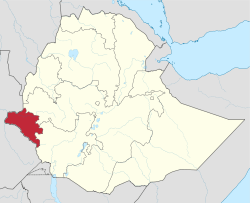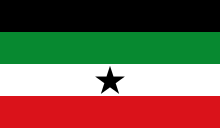Wentawo
Wentawo is one of the woredas in the Gambela Region of Ethiopia. Part of the Nuer Zone, Wentawo is bordered on the south by Akobo, on the west and north by South Sudan, on the east by Jikawo, and on the southeast by Anuak Zone; the Akobo River to the west and the Baro River on the north define Wentawo's boundaries with South Sudan. Towns in this woreda include Metar.

The terrain in Wentawo is predominantly swampy, with few distinguishing high points; elevations range around 410 meters above sea level. Rivers include the Mekwai.
Between 2001 and 2007, the northern kebeles were split from Akobo woreda to create Wantawo.[1]
Demographics
Based on the 2007 Census conducted by the Central Statistical Agency of Ethiopia (CSA), this woreda has a total population of 20,970, of whom 10,991 are men and 9,979 women; with an area of 887.74 square kilometers, Wentawo has a population density of 23.62, which is less than the Zone average of 23.79 persons per square kilometer. While 2,851 or 13.60% are urban inhabitants, a further 59 individuals are pastoralists. A total of 3,996 households were counted in this woreda, which results in an average of 5.2 persons to a household, and 3,846 housing units. The majority of the inhabitants said they were Protestant, with 92.82% of the population reporting they observed this belief, while 3.22% practiced traditional religions, 1.89% were Catholic, and 1.58% of the population practised Ethiopian Orthodox Christianity.[2]
References
- According to Dereje Feyissa this reorganization, which happened in 2003, was done to align territories inside the Gambela Region with the presence of local ethnic groups. (Dereje, "The Experience of the Gambela Regional State", in Ethnic Federalism: The Ethiopian Experience in Comparative Perspective [Oxford: James Currey, 2006], p. 223)
- Census 2007 Tables: Gambela Region, Tables 2.1, 2.4, 2.5, 3.1, 3.2 and 3.4.
